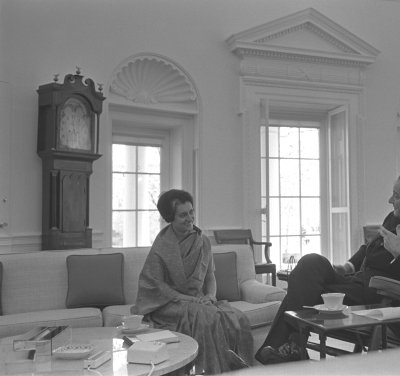Topic: Iva Toguri D'Aquino
Iva Ikuko Toguri D'Aquino (July 4, 1916 – September 26, 2006), was an American citizen who participated in English-language propaganda broadcast transmitted by Radio Tokyo to Allied soldiers in the South Pacific during World War II. Although on the "Zero Hour" radio show, Toguri called herself "Orphan Ann," she quickly became identified with the moniker "Tokyo Rose", a name that was coined by Allied soldiers and that predated her broadcasts. After the Japanese defeat, Toguri was detained for a year by the U.S. military before being released for lack of evidence. Department of Justice officials agreed that her broadcasts were "innocuous". But when Toguri tried to return to the US, a popular uproar ensued, prompting the Federal Bureau of Investigation to renew its investigation of Toguri's wartime activities. She was subsequently charged by the United States Attorney's Office with eight counts of treason. Her 1949 trial resulted in a conviction on one count, making her the seventh American to be convicted on that charge. In 1974, investigative journalists found that key witnesses had lied during testimony. Toguri was pardoned by U.S. President Gerald Ford in 1977.
She was born Iva Ikuko Toguri (戸栗郁子 アィバ, Toguri Ikuko Iva?) in Los Angeles, a daughter of Japanese immigrants. Her father, Jun Toguri, had come to the U.S. in 1899, and her mother, Fumi, in 1913. Iva was a Girl Scout as a child, and was raised as a Methodist. She attended grammar schools in Mexico and San Diego before returning with her family to Los Angeles. There she finished grammar school, attended high school, and graduated from the University of California, Los Angeles, with a degree in zoology. She then went to work in her parents' shop. As a registered Republican, she voted for Wendell Wilkie in the 1940 presidential election.
On July 5, 1941, Toguri sailed for Japan from Los Angeles' San Pedro area, to visit an ailing relative and to possibly study medicine. The U.S. State Department issued her a Certificate of Identification; she did not have a passport. In September, Toguri applied to the U.S. Vice Consul in Japan for a passport, stating she wished to return to her home in the U.S. Her request was forwarded to the State Department, but the answer had not returned by the time of the attack on Pearl Harbor (December 7, 1941) and she was stranded in Japan.
It uses material from the Wikipedia article "Iva Toguri D'Aquino."







